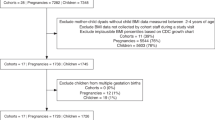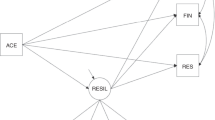Abstract
Background
Household food insecurity (HFI) is associated with poor general and mental health. Prior studies assessed parent and child mental health separately and did not assess other social risks.
Objective
To assess the relationship between HFI and both parental and child mental health.
Methods
Parents of 3–5-year-old children completed validated measures of food insecurity and mental health. Separate linear regression models were used for unadjusted analysis for each mental health outcome (parent depression, anxiety, and stress, and child mental health). Multivariable analysis was performed using hierarchical regression to adjust for relevant covariates.
Results
Children (n = 335) were racially and socioeconomically diverse. HFI was reported in 10% of participants. HFI was associated with worse parent depression and stress in unadjusted analyses; however, after adjusting for covariates, the associations became insignificant. HFI was significantly associated with worse child mental health in unadjusted and multivariable analysis (aβ 2.24, 95% CI 0.59–3.88) compared to those without HFI.
Conclusion
HFI was not associated with parental mental health outcomes when other social risks were included in the analyses; however, HFI was significantly associated with worse childhood mental health in all analyses. Pediatric providers should screen for and develop interventions to target both HFI and mental health.
Impact
-
Household food insecurity was associated with worse parent depression and stress in unadjusted analyses; however, after adjusting for other social risks, the associations became insignificant.
-
Household food insecurity was significantly associated with worse child mental health, even after adjusting for demographics, other social risks, and parent mental health.
-
Social risks are differentially associated with parent and child mental health.
-
Understanding the complexities of family stressors can help better support parents and children struggling with mental health problems and social risks.
This is a preview of subscription content, access via your institution
Access options
Subscribe to this journal
Receive 14 print issues and online access
$259.00 per year
only $18.50 per issue
Buy this article
- Purchase on Springer Link
- Instant access to full article PDF
Prices may be subject to local taxes which are calculated during checkout
Similar content being viewed by others
Data availability
The datasets generated during and/or analyzed during the current study are available from the corresponding author on reasonable request.
References
Weitzman, M., Rosenthal, D. G. & Liu, Y.-H. Paternal depressive symptoms and child behavioral or emotional problems in the United States. Pediatrics 128, 1126–1134 (2011).
Tseng, K. P. et al. Parental psychological distress and family food insecurity: sad dads in hungry homes. J. Dev. Behav. Pediatr. 38, 611–618 (2017).
Alisha Coleman-Jensen, M. R., Christian G, Anita S. Household food security in the United States in 2020. Economic Research Service Economic Research Report 298 (2021).
Drammeh, W., Hamid, N. & Jalil, R. Determinants of household food insecurity and its association with child malnutrition in Sub-Saharan Africa: a review of the literature. Curr. Res. Nutr. Food Sci. J. 7, 610–623 (2019).
Hackett, M., Melgar-Quiñonez, H., Taylor, C. A. & Alvarez Uribe, M. C. Factors associated with household food security of participants of the Mana Food Supplement Program in Colombia. Arch. Latinoam. Nutr. 60, 42–47 (2010).
Alaimo, K., Olson, C. M., Frongillo, E. A. Jr. & Briefel, R. R. Food insufficiency, family income, and health in us preschool and school-aged children. Am. J. Public Health 91, 781–786 (2001).
Whitaker, R. C., Phillips, S. M. & Orzol, S. M. Food insecurity and the risks of depression and anxiety in mothers and behavior problems in their preschool-aged children. Pediatrics 118, e859 (2006).
Darling, K. E., Fahrenkamp, A. J., Wilson, S. M., D’Auria, A. L. & Sato, A. F. Physical and mental health outcomes associated with prior food insecurity among young adults. J. Health Psychol. 22, 572–581 (2017).
Thomas, M. M. C., Miller, D. P. & Morrissey, T. W. Food insecurity and child health. Pediatrics 144, e20190397 (2019).
Alaimo, K., Olson, C. M. & Frongillo, E. A. Family food insufficiency, but not low family income, is positively associated with dysthymia and suicide symptoms in adolescents. J. Nutr. 132, 719–725 (2002).
Cook, J. T. et al. Food insecurity is associated with adverse health outcomes among human infants and toddlers. J. Nutr. 134, 1432–1438 (2004).
Cain, K. S. et al. Association of food insecurity with mental health outcomes in parents and children. Acad. Pediatr. 22, 1105–1114 (2022).
Garg, A., Toy, S., Tripodis, Y., Cook, J. & Cordella, N. Influence of maternal depression on household food insecurity for low-income families. Acad. Pediatr. 15, 305–310 (2015).
McLaughlin, K. A. et al. Food insecurity and mental disorders in a national sample of U.S. adolescents. J. Am. Acad. Child Adolesc. Psychiatry 51, 1293–1303 (2012).
Masarik, A. S. & Conger, R. D. Stress and child development: a review of the Family Stress Model. Curr. Opin. Psychol. 13, 85–90 (2017).
Steimle, S., Gassman-Pines, A., Johnson, A. D., Hines, C. T. & Ryan, R. M. Understanding patterns of food insecurity and family well-being amid the COVID-19 pandemic using daily surveys. Child Dev. 92, e781–e797 (2021).
Nagata, J. M., Gomberg, S., Hagan, M. J., Heyman, M. B. & Wojcicki, J. M. Food insecurity is associated with maternal depression and child pervasive developmental symptoms in low-income Latino households. J. Hunger Environ. Nutr. 14, 526–539 (2019).
Greder, K. A., Peng, C., Doudna, K. D. & Sarver, S. L. Role of family stressors on rural low-income children’s behaviors. Child Youth Care Forum 46, 703–720 (2017).
Arterburn, D. et al. Validity of clinical body weight measures as substitutes for missing data in a randomized trial. Obes. Res Clin. Pract. 2, 277–281 (2008).
Hager, E. R. et al. Development and validity of a 2-item screen to identify families at risk for food insecurity. Pediatrics 126, e26–e32 (2010).
Nord M, A. M., Carlson S. Household food security in the United States. USDA-ERS Economic Research Report 11 (2005).
Dubowitz, H., Feigelman, S., Lane, W. & Kim, J. Pediatric primary care to help prevent child maltreatment: The Safe Environment for Every Kid (SEEK) Model. Pediatrics 123, 858–864 (2009).
Spencer, A. E. et al. The relationship between social risks and the mental health of school-age children in primary care. Acad. Pediatr. 20, 208–215 (2020).
Kroenke, K., Spitzer, R. L. & Williams, J. B. The Patient Health Questionnaire-2: validity of a two-item depression screener. Med. Care 41, 1284–1292 (2003).
Kroenke, K., Spitzer, R. L., Williams, J. B., Monahan, P. O. & Löwe, B. Anxiety disorders in primary care: prevalence, impairment, comorbidity, and detection. Ann. Intern. Med. 146, 317–325 (2007).
Cohen, S., Kamarck, T. & Mermelstein, R. A global measure of perceived stress. J. Health Soc. Behav. 24, 385–396 (1983).
Deborah, E., Linares, R. E. A. & Gopal, K. S. Social determinants of health associated with mental health among U.S. mothers with children aged 0–5 years. J. Womens Health 29, 1039–1051 (2020).
Gassman-Pines, A. & Schenck-Fontaine, A. Daily food insufficiency and worry among economically disadvantaged families with young children. J. Marriage Fam. 81, 1269–1284 (2019).
Melchior, M. et al. Mental health context of food insecurity: a representative cohort of families with young children. Pediatrics 124, e564–e572 (2009).
Hines, C. T., Markowitz, A. J. & Johnson, A. D. Food insecurity: what are its effects, why, and what can policy do about it? Policy Insights Behav. Brain Sci. 8, 127–135 (2021).
Kleinman, R. E. et al. Hunger in children in the United States: potential behavioral and emotional correlates. Pediatrics 101, e3–e3 (1998).
Melchior, M. et al. Food insecurity and children’s mental health: a prospective birth cohort study. PLoS One 7, e52615 (2012).
Gee, K. A. & Asim, M. Parenting while food insecure: links between adult food insecurity, parenting aggravation, and children’s behaviors. J. Fam. Issues 40, 1462–1485 (2019).
Dennison, M. J. et al. Differential associations of distinct forms of childhood adversity with neurobehavioral measures of reward processing: a developmental pathway to depression. Child Dev. 90, e96–e113 (2019).
Prokosch, C. et al. Exploring associations between social determinants of health and mental health outcomes in families from socioeconomically and racially and ethnically diverse households. Prev. Med. 161, 107150 (2022).
Gassman-Pines, A., Copeland, W. E., Hoyle, R. H. & Odgers, C. L. in Food Insecurity in Families with Children: Integrating Research, Practice, and Policy (eds Fiese, B. H. & Johnson, A. D.) 77–94 (Springer International Publishing, 2021).
Conger, R. D., Conger, K. J. & Martin, M. J. Socioeconomic status, family processes, and individual development. J. Marriage Fam. 72, 685–704 (2010).
Fram, M. S. et al. Children are aware of food insecurity and take responsibility for managing food resources. J. Nutr. 141, 1114–1119 (2011).
Ghandour, R. M. et al. Prevalence and treatment of depression, anxiety, and conduct problems in US children. J. Pediatr. 206, 256–267.e253 (2019).
Salas-Wright, C. P., Vaughn, M. G., Cohen, M. & Schwartz, S. J. The sequelae of premigration hunger among Venezuelan immigrant children in the U.S. Am. J. Prev. Med. 58, 467–469 (2020).
Singh, G., Zhu, H. & Cheung, C. R. Public health for paediatricians: fifteen-minute consultation on addressing child poverty in clinical practice. Arch. Dis. Child. Educ. Pract. Ed. 106, 326 (2021).
Funding
This study and C.L.B. were supported by a grant from the National Institute for Child Health and Human Development (grant K23HD099249). The content is solely the responsibility of the authors and does not necessarily represent the official views of the National Institutes of Health. The funding organization has no role in the design and conduct of the study; collection, management, analysis, and interpretation of the data; preparation, review, or approval of the manuscript; and decision to submit the manuscript for publication.
Author information
Authors and Affiliations
Contributions
G.D. conceptualized and designed the study, interpreted data, drafted the initial manuscript, and approved the final manuscript as submitted. C.B.L. conceptualized and designed the study, performed data collection, revised the manuscript critically for important intellectual content, and approved the final manuscript as submitted. J.A.S., E.H.I., and M.Z.V. conceptualized and designed the study, interpreted data, revised the manuscript critically for important intellectual content, and approved the final manuscript as submitted. C.L.B. conceptualized and designed the study, coordinated and supervised data collection, carried out the initial analyses, revised the manuscript critically for important intellectual content, and approved the final manuscript as submitted.
Corresponding author
Ethics declarations
Competing interests
The authors declare no competing interests.
Consent to participate
Written informed consent was obtained from parents prior to participation. Assent from the child was not obtained as children were <7 years old.
Additional information
Publisher’s note Springer Nature remains neutral with regard to jurisdictional claims in published maps and institutional affiliations.
Rights and permissions
Springer Nature or its licensor (e.g. a society or other partner) holds exclusive rights to this article under a publishing agreement with the author(s) or other rightsholder(s); author self-archiving of the accepted manuscript version of this article is solely governed by the terms of such publishing agreement and applicable law.
About this article
Cite this article
Dean, G., Vitolins, M.Z., Skelton, J.A. et al. The association of food insecurity with mental health in preschool-aged children and their parents. Pediatr Res 94, 290–295 (2023). https://doi.org/10.1038/s41390-022-02458-1
Received:
Revised:
Accepted:
Published:
Issue Date:
DOI: https://doi.org/10.1038/s41390-022-02458-1



